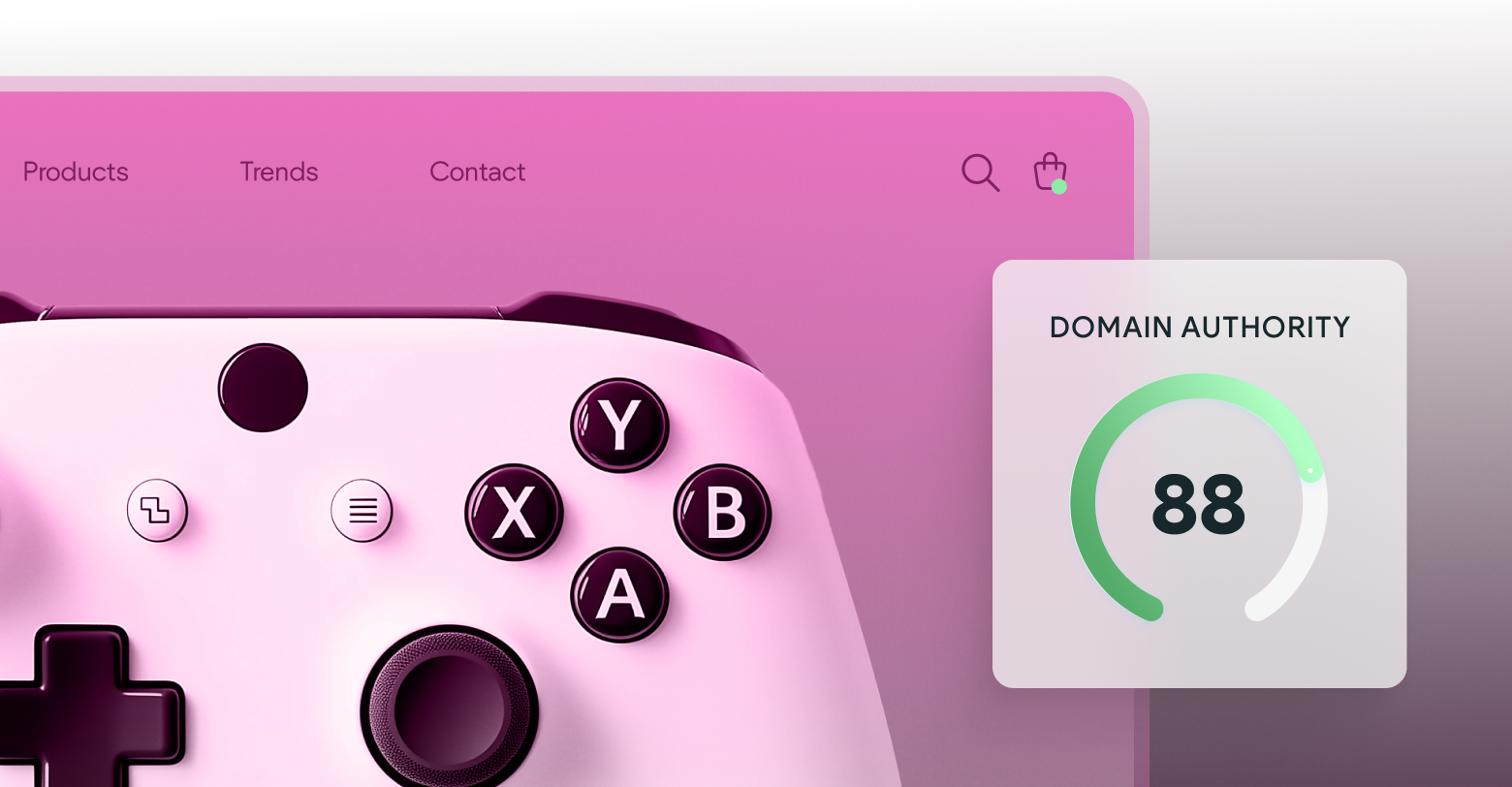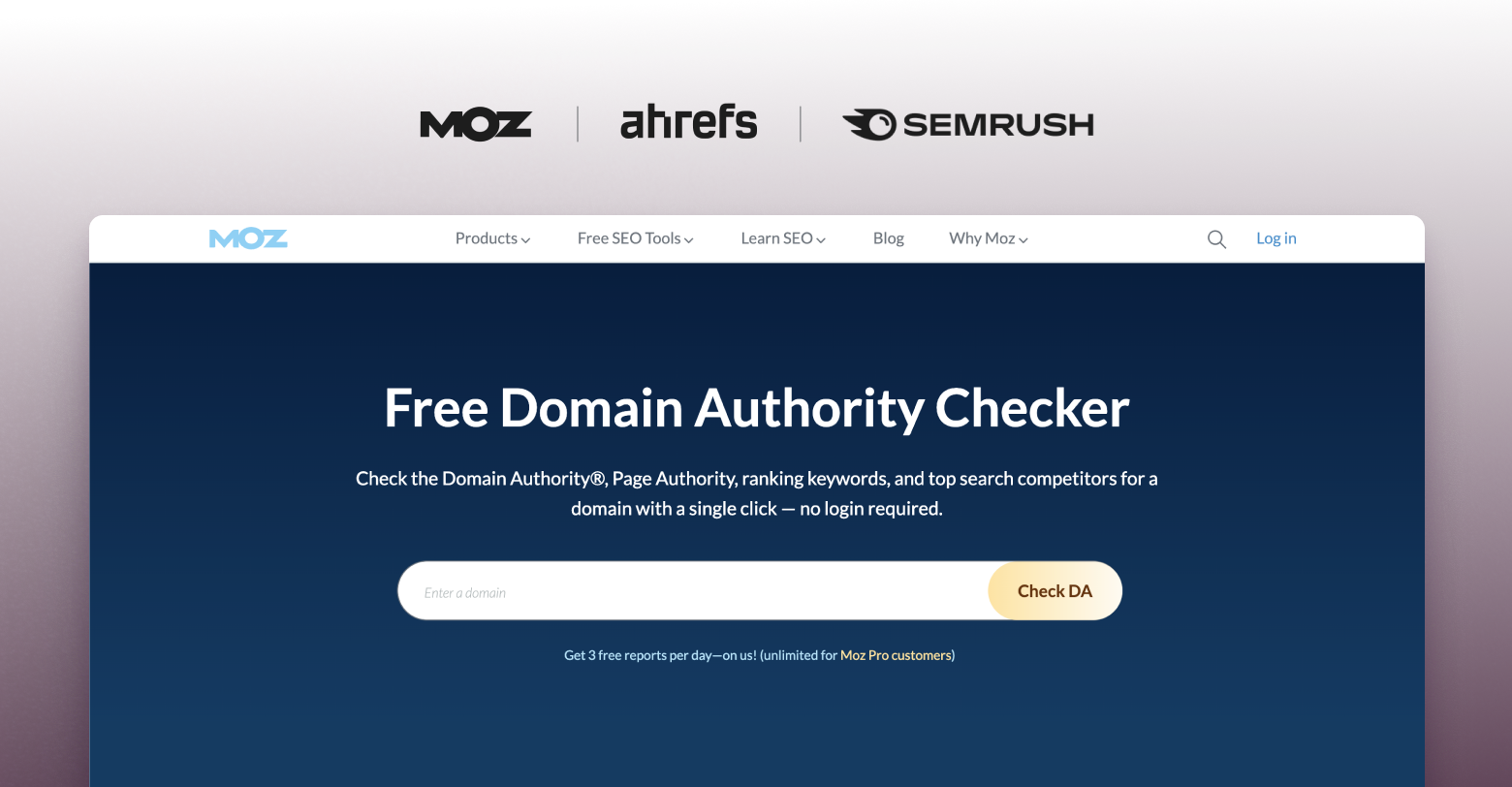Domain authority matters—but only if you're measuring it correctly.
For agencies managing multiple client sites, choosing the right domain authority (DA) checker isn't about finding the "best" tool. It's about finding the tool that fits your workflow, delivers consistent data, and helps you make faster decisions about link building, competitor analysis, and SEO strategy.
This guide walks you through how domain authority works, which tools deliver reliable metrics, and how to use DA data to drive real improvements in your clients' search rankings.
What domain authority actually measures
Domain authority is a predictive metric developed by Moz that estimates how likely a website is to rank in search results. The score ranges from 1 to 100, with higher scores indicating stronger ranking potential.
DA isn't a Google ranking factor—Google doesn't use it in its algorithm. But DA correlates strongly with ranking performance because it's built on signals Google does care about: quality backlinks, linking domain diversity, and overall link profile strength.
When you're evaluating a client site or analyzing competitors, DA gives you a quick snapshot of relative authority. A site with DA 45 will typically outrank a site with DA 25 for similar keywords, assuming other factors are comparable.
Why agencies need reliable DA checkers
You're not checking domain authority for vanity metrics. You're using it to:
- Prioritize link building targets: Identify which sites are worth pursuing for backlinks based on their authority relative to your client's site
- Assess competitor strength: Understand the SEO landscape before recommending keyword targets or content strategies
- Track progress over time: Monitor whether your link building and SEO efforts are moving the authority needle
- Set realistic client expectations: Show clients where they stand relative to competitors and what's achievable
The right DA checker saves you time by delivering this data quickly, consistently, and in a format that integrates with your existing workflow.
The main domain authority checkers compared
Several tools measure domain authority or similar metrics. Each uses slightly different methodologies and data sources.
Moz Domain Authority
Moz created the domain authority metric. Their DA score is calculated using machine learning models that analyze linking root domains, total links, MozRank, MozTrust, and other factors.
When to use it: Moz DA is the industry standard. If you're communicating with clients or other agencies, referencing Moz DA ensures everyone's speaking the same language.
Limitations: Moz's link index is smaller than some competitors. You might see different DA scores than what other tools report for authority.
Pricing: Free for limited checks. Moz Pro starts at $179/month for unlimited checks and additional SEO tools.
Ahrefs Domain Rating
Ahrefs measures
Domain Rating (DR), which focuses specifically on the strength and quantity of backlinks pointing to a site. DR ranges from 0 to 100.
When to use it: Ahrefs has one of the largest and most frequently updated backlink indexes. If you need detailed link data alongside authority metrics, Ahrefs delivers both.
Limitations: DR is purely link-based. It doesn't factor in other signals like content quality or user engagement that might influence actual rankings.
Pricing: Starts at
$29/month. Simple checks are free.
Semrush Authority Score
Semrush Authority Score combines backlink data with organic traffic data and other signals. Scores range from 0 to 100.
When to use it: If you're already using Semrush for keyword research or site audits, the Authority Score integrates seamlessly into your existing reports.
Limitations: The methodology is less transparent than Moz or Ahrefs, making it harder to explain score changes to clients.
Pricing: Semrush One plans start at $165.17/month and include Authority Score as part of broader SEO toolsets.
Majestic Trust Flow and Citation Flow
Majestic offers two metrics: Trust Flow (quality of backlinks) and Citation Flow (quantity of backlinks). Both range from 0 to 100.
When to use it: Trust Flow is particularly useful when evaluating link quality. A high Trust Flow relative to Citation Flow indicates a clean, authoritative link profile.
Limitations: Majestic's interface feels dated compared to newer tools. The dual-metric system can confuse clients who expect a single authority score.
Pricing: Lite plan at $49.99/month. More comprehensive plans run $99.99 and up.
How to choose the right tool for your agency
Your choice depends on three factors: what you're already using, what your clients need to see, and how often you check domain authority.
If you're building a new SEO stack
Start with Moz. The DA metric is widely recognized, the free tier lets you test it without commitment, and Moz Pro integrates well with other tools if you scale up later.
If you need deep backlink analysis
Choose Ahrefs. The combination of Domain Rating and detailed backlink data makes it the strongest option for agencies focused on link building.
If you want all-in-one SEO reporting
Go with Semrush. You'll get authority metrics alongside keyword tracking, site audits, and competitive intelligence in a single platform, reducing tool sprawl.
If budget is tight
Use Moz's free DA checker for spot checks and Majestic's Lite plan ($49.99/month) for ongoing monitoring. This combination covers most agency needs without breaking $100/month.
How to use domain authority data to improve client SEO
Checking DA is the starting point. Using it strategically drives results.
Set link building priorities
Pull DA scores for potential link targets. Focus your outreach on sites with DA 10-20 points higher than your client's current score. Links from sites with significantly higher DA pass more authority and have greater ranking impact.
Avoid wasting time on sites with DA below your client's score unless there's strong topical relevance or traffic potential.
Benchmark against competitors
Identify your client's top 5-10 organic competitors for their primary keywords. Check their DA scores. This tells you whether you're competing in a space where you need to build authority or where you can win through better content and on-page optimization.
If competitors average DA 60 and your client sits at DA 30, link building becomes the primary strategy. If the gap is smaller—say DA 42 versus DA 38—focus on content quality and technical SEO to gain ground faster.
Track progress monthly
Domain authority changes slowly. Monthly checks are sufficient for most clients. Quarterly is fine for smaller sites with less aggressive link building.
Export DA scores into a simple spreadsheet or dashboard. Show clients the trend over time rather than obsessing over small month-to-month fluctuations. A site moving from DA 28 to DA 34 over six months indicates meaningful progress.
Identify link building gaps
If your client's DA isn't growing despite consistent link acquisition, check the quality of incoming links. Use Ahrefs or Moz to review the DR or DA of linking domains. If most links come from low-authority sites, you're building quantity without quality.
Shift strategy toward fewer, higher-quality links from authoritative sources in your client's industry.
Common mistakes when using domain authority metrics
Treating DA as a ranking guarantee
High domain authority doesn't guarantee rankings. A DA 70 site with thin content and poor user experience will lose to a DA 45 site with comprehensive, well-optimized content.
Use DA to assess competitive landscape and link building priorities, not as a substitute for on-page SEO and content strategy.
Comparing DA across different tools
Moz DA, Ahrefs DR, and Semrush Authority Score use different calculation methods. A site with Moz DA 50 might have Ahrefs DR 60. These differences are normal.
Pick one tool and stick with it for internal tracking and client reporting. Mixing metrics creates confusion and makes progress harder to communicate.
Ignoring DA changes after algorithm updates
Google algorithm updates can shift rankings independent of domain authority. If your client's rankings drop but DA remains stable, the issue likely lies elsewhere—content quality, technical issues, or user experience.
Don't default to "we need more links" every time rankings fluctuate. Use DA as one data point among many.
Moving forward
Choosing a domain authority checker isn't complicated. Identify what you need—quick spot checks, detailed backlink data, or integrated reporting—and pick the tool that fits your workflow and budget.
Once you have consistent DA data, use it to prioritize link building targets, benchmark against competitors, and track progress over time. That's how domain authority becomes a practical tool rather than a vanity metric.
Start with one tool, check your clients' sites monthly, and adjust your SEO strategy based on what the data reveals. You'll make faster decisions and deliver clearer results.








